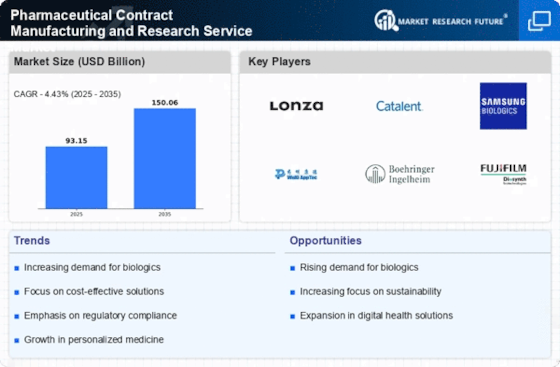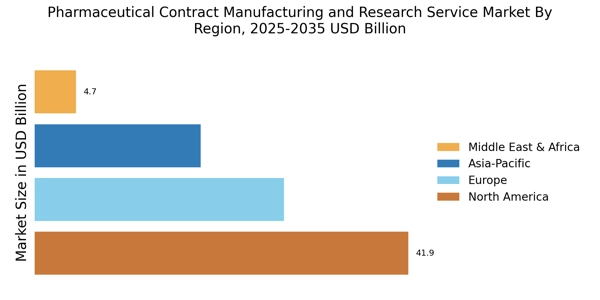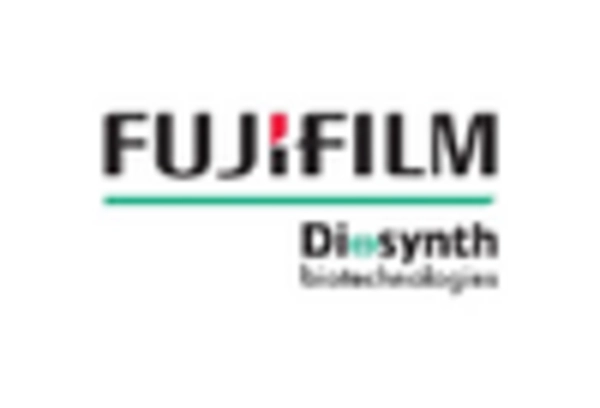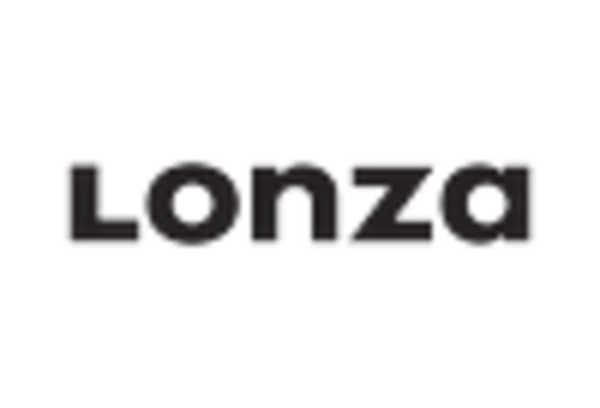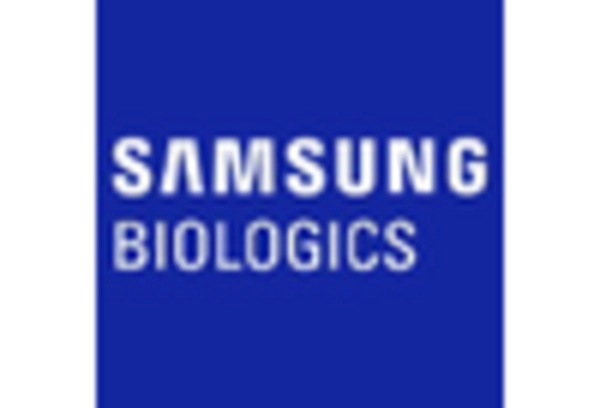Rising R&D Expenditure
The Pharmaceutical Contract Manufacturing and Research Service Market is significantly influenced by the rising expenditure on research and development (R&D) by pharmaceutical companies. As firms strive to innovate and bring new drugs to market, they are increasingly outsourcing manufacturing and research services to specialized contract organizations. This trend is underscored by the fact that global pharmaceutical R&D spending has reached impressive levels, with billions allocated annually. Such investments are essential for the development of new therapies, particularly in complex areas such as oncology and rare diseases. Consequently, contract manufacturers are positioned to benefit from this influx of R&D funding, as they provide the necessary expertise and infrastructure to support the drug development lifecycle.
Focus on Cost Efficiency
Cost efficiency remains a pivotal driver in the Pharmaceutical Contract Manufacturing and Research Service Market. Pharmaceutical companies are under constant pressure to reduce operational costs while maintaining high-quality standards. As a result, many firms are turning to contract manufacturers to leverage their economies of scale and specialized expertise. By outsourcing production and research services, companies can focus their resources on core competencies such as drug discovery and marketing. Industry analyses suggest that outsourcing can lead to significant cost savings, which is particularly appealing in a competitive market. This trend underscores the importance of strategic partnerships between pharmaceutical companies and contract manufacturers, as they work collaboratively to optimize processes and enhance overall productivity.
Expansion of Emerging Markets
The Pharmaceutical Contract Manufacturing and Research Service Market is witnessing growth due to the expansion of emerging markets, where pharmaceutical companies are increasingly establishing operations. These regions offer cost advantages and a growing patient population, making them attractive for contract manufacturing. As companies seek to penetrate these markets, they often rely on local contract manufacturers to navigate regulatory landscapes and optimize production costs. Reports indicate that the pharmaceutical market in emerging economies is expected to grow at a rapid pace, further driving demand for contract services. This trend not only enhances the global footprint of contract manufacturers but also allows them to leverage local expertise and resources, thereby fostering innovation and efficiency.
Increasing Demand for Personalized Medicine
The Pharmaceutical Contract Manufacturing and Research Service Market is experiencing a notable shift towards personalized medicine, driven by advancements in genomics and biotechnology. This trend is characterized by the development of tailored therapies that cater to individual patient profiles, which necessitates specialized manufacturing processes. As a result, contract manufacturers are increasingly required to adapt their capabilities to meet the unique demands of personalized treatments. According to industry reports, the market for personalized medicine is projected to reach substantial figures, indicating a growing need for contract services that can efficiently produce small batches of customized drugs. This evolution not only enhances patient outcomes but also presents lucrative opportunities for contract manufacturers to expand their service offerings and invest in innovative technologies.
Regulatory Compliance and Quality Assurance
Regulatory compliance and quality assurance are critical factors influencing the Pharmaceutical Contract Manufacturing and Research Service Market. As the pharmaceutical landscape becomes increasingly complex, manufacturers must adhere to stringent regulations set forth by health authorities. This necessitates a robust quality management system and a commitment to continuous improvement. Contract manufacturers play a vital role in ensuring that products meet regulatory standards, which is essential for gaining market access. The emphasis on compliance has led to the implementation of advanced quality control measures and the adoption of best practices in manufacturing. Industry data indicates that companies prioritizing quality assurance are more likely to achieve successful product launches and maintain a competitive edge in the market.


